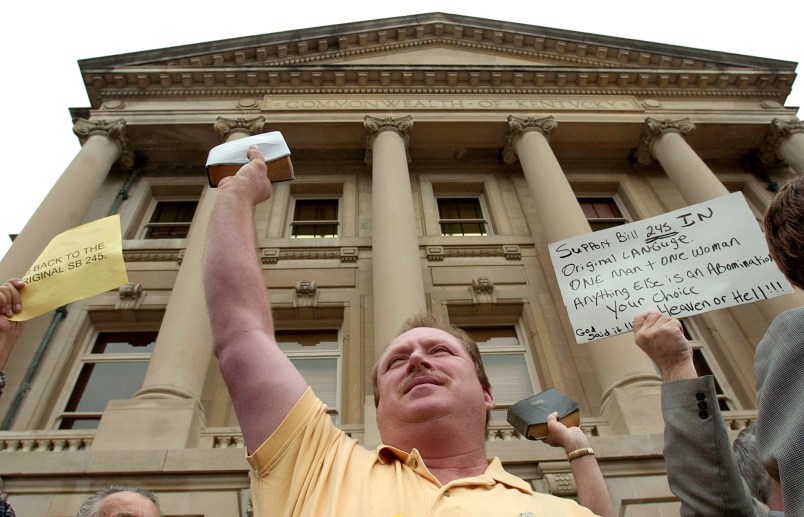The growing specter of legalized gay marriage, which has been advanced by numerous court decisions starting with the Supreme Court’s overturning of the federal Defense of Marriage Act last year, seems to have put a scare in GOP lawmakers.
So they’ve started legislating, introducing a string of similar bills that claim to defend religious liberty, but would effectively allow for lawful discrimination against same-sex couples by businesses or government employees on religious grounds.
The bills have appeared in Congress and at least six state legislatures. One cleared the Kansas House last week and a South Dakota House committee is scheduled to consider another Wednesday, while a Tennessee Senate committee at least temporarily killed its bill Tuesday. Advocates say that they combine to form a newly invigorated push for anti-gay discrimination.
“We’re seeing an expansion, or a proliferation, of this effort,” Jennifer Pizer, director of the law and policy project at Lambda Legal, the civil rights group that advocates for gay rights, told TPM. “This is a more aggressive, or maybe it’s desperate, but certainly a more aggressive approach.”
“With more states allowing same-sex couples to marry, with more courts vindicating these constitutional claims, it is definitely inspiring more aggressive backlash by the groups that see those court decisions as indicating that the tide is against them.”
The catalyst, it seems, was the Supreme Court’s DOMA decision in June. U.S. Rep. Raul Labrador (R-ID) introduced a bill in September that would prohibit the federal government from “taking an adverse action” against any person if their actions are based on their religious belief that marriage should be between a man and a woman. U.S. Sen. Mike Lee (R-UT) introduced the essentially same bill in that chamber in December, but both have languished in committee.
And then in the last three months, same-sex marriage bans in three states (Utah, Oklahoma and Virginia) have been overturned, citing the DOMA decision.
Now legislation has popped up in Kansas, South Dakota and Tennessee in the last few weeks, which would give private businesses and individual government workers the right to deny services to same-sex couples if it would violate their “sincerely held religious beliefs,” as both the Kansas and Tennessee bills put it.
Bills in Arizona, Idaho and Mississippi share more in common with the law passed in Kentucky last year, the first of its kind, which prohibits, without a compelling reason, government interference with a person acting in line with their religious beliefs — which gay rights advocates say could lead to discrimination against LGBT residents.
In Oregon, voters will decide in November on a ballot initiative that would allow discrimination against same-sex married couples if motivated by religious considerations. (The state’s voters, at the same time, will consider a separate initiative to legalize same-sex marriage.)
Local reports characterized the Kansas and Tennessee bills as preemptive responses to the possibilities that the states’ bans on gay marriage could be struck down by a court.
“Discrimination is horrible. It’s hurtful. It has no place in civilized society, and that’s precisely why we’re moving this bill,” Kansas Rep. Charles Macheers, one of the Republicans who voted for that state’s bill, said on the House floor. “There have been times throughout history where people have been persecuted for their religious beliefs because they were unpopular. This bill provides a shield of protection for that.”
“We want to make sure we protect the conscience and religious freedom of businesses,” Tennessee Sen. Mike Bell, the bill’s sponsor, told the Tennessean.
The Kansas House legislation was shot down by state senate GOP leaders, while the Tennessee bill didn’t make it out of committee; both halted by outcry over their potential impact. But the Mississippi bill cleared the Senate, and the Arizona House leadership has urged passage of its legislation.
With a movement seemingly underway, Pizer said she expects to see similar bills in other GOP-controlled states soon, and then litigation if one of them were to ever become law.
“I do absolutely think this is the next set of challenges, the next battleground, if you will,” she said. “No question about that.”






